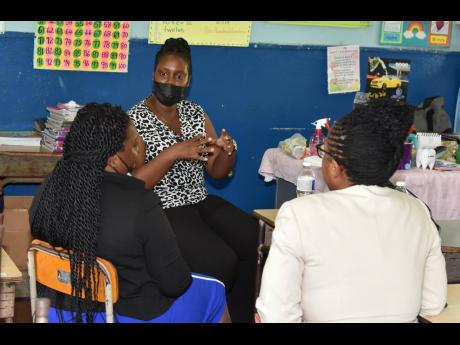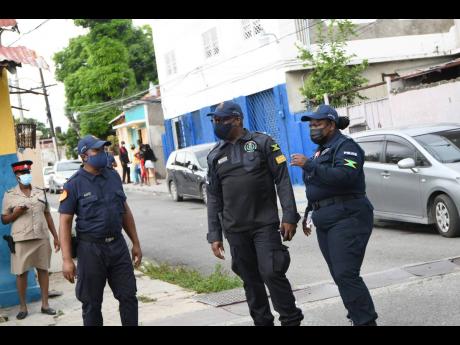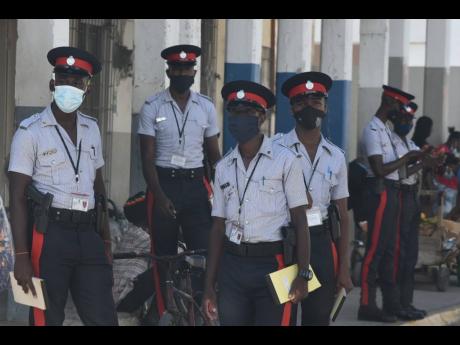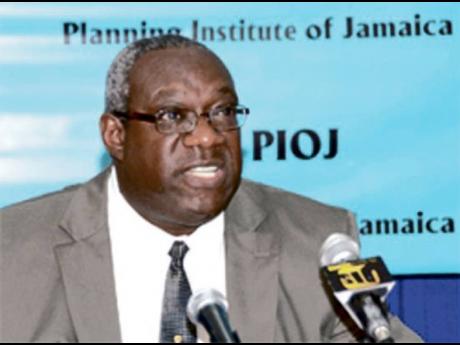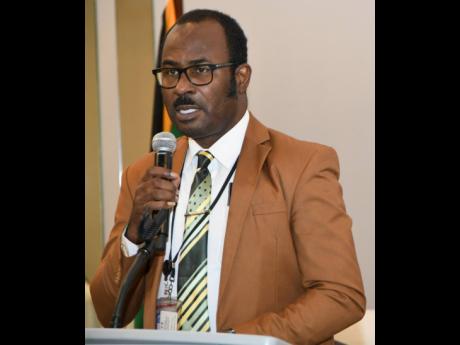Noisy chatter
Former PIOJ head scoffs at migration critics, says J’cans just trying to survive as brain drain impacts all sectors
Former Planning Institute of Jamaica (PIOJ) head, Professor Gladstone Hutchinson, has described much of the furore over Jamaicans migrating to seek better opportunities abroad as noise. There is currently a high level of concern over attrition...
Former Planning Institute of Jamaica (PIOJ) head, Professor Gladstone Hutchinson, has described much of the furore over Jamaicans migrating to seek better opportunities abroad as noise.
There is currently a high level of concern over attrition rates in the education arena ahead of the new school year, similar to long-standing cries by other sector leaders, including health, especially nursing, which have been amplified over the past year.
Recent comments by Montego Bay Deputy Mayor Richard Vernon, who labelled expatriates who sought jobs overseas with no intention of developing their homeland as “cowards”, has added fuel to the fire even as the Holness administration appeals to Jamaicans to be patriots.
Using 2007-2022 data from central banks, national authorities, the World Bank, the United Nations, and the International Monetary Fund, TheGlobalEconomy.com has also ranked Jamaica second out of 177 countries of having the most debilitating human flight and brain drain index.
Hutchinson, a specialist in the economics of developing and emerging-market countries and a professor at LaFayette College in Pennsylvania in the United States, told The Sunday Gleaner that Jamaica's entire economic and social platform since the 1950s has been based on a pillar of migration.
“It does not matter whether it is full or part-time migration. It has always been going on, so for them to be punching now at the teachers is really a lot of noise. Remember a few years ago, it was the nurses. It is still the nurses. It will be some category or the other for a number of reasons, and better remuneration is not always at the top of the list,” he said.
CHANGE IN MIGRATION PATTERN
The former PIOJ boss further stated that Jamaica has not had a revolution in the last quarter century, particularly because of the contribution of the diaspora to the local economy, through remittances and investments.
“The migration pattern and numbers over the last 25, 30 years have changed significantly. It used to be the men who would go through various ways, including farm work, and take up families. Siblings could also file for each other. But it started to change, especially when the nurses started to migrate. So we see a change in the demographic and skills levels,” Hutchinson said, assessing the situation.
“The really big change was when people invested in at least one child getting a degree and then an overseas job. Now that becomes a source of income. So the Bank of Jamaica begins to track and say the migration pattern has changed significantly. No longer is it being dominated by the poor and underclass, the nurses and teachers, but by the middle class also migrating,” he explained.
The new class of immigrants, said Hutchinson, were now courted by financial organisations to invest in Jamaica.
“So people were no longer only sending barrels, but were buying town houses and getting into the stock exchange. So rather than save their money and get one per cent interest in USA, they get a better deal to invest in Jamaica. You export your human capital and remittance is the return on that investment. This is the reason why Jamaica did not have a revolution during COVID-19, and that is the reason why we had not had a revolution in the last 15 to 20 years. The money (remittances) keeps systems working and it keeps the inner cities going. So it is a lot of noise. Pure noise,” he told The Sunday Gleaner.
“People are just trying to survive,” Hutchinson said.
Health Minister Dr Christopher Tufton told Parliament in March that more than 700 nurses had left Jamaica for jobs overseas since the start of the COVID-19 pandemic.
Bracing for the worst, he said that as the pandemic “subsided and the short-term economic shock takes hold, we will have a stronger migration pull ... . The impact on our system will be even more severe if we do not take some corrective measures”.
The nurses leaving the local public sector are among the most experienced and skilled, hospital administrators have said, expressing concern over the amount of time it will take to train new staff to fill some roles.
BETTER WORKING CONDITIONS
Melanie Guelp spent 12 years at the Kingston Public Hospital (KPH) and migrated in 2019, months before the pandemic struck, with a recruitment package making allowance for her family.
“When I received my first pay cheque in 2007, I nearly died when I saw that it was $55,000 before tax,” she said of her time in Jamaica.
“Now, I work three days per week. My basic annual salary is US$70,000 (J$10.6 million) plus insurance after working 12-hour shifts, and I have the opportunity to earn another US$20,000 (J$3 million). I am about to put in my application for US citizenship now, but the truth is, if I could earn half of my current salary [in Jamaica], I would come right back home,” Guelp told The Sunday Gleaner yesterday.
Of her graduating cohort of 50 nurses, only 10 have remained in the island.
Now, she is completing her Bachelor of Science in Nursing and has benefited from the Biden administration's student loan debt forgiveness announced last week. She is also able to comfortably pay tuition for her children's university fees and help with her grandchildren's private school fees.
Guelp said that nurses, like other professionals, were only trying to secure basic things such as a house, a car and a better quality of life. And while remuneration was important, the working environment is also critical, she said, labelling that of the KPH as toxic.
“Since 2017, Jamaica has been experiencing a zero per cent annual rate of growth. Demographic processes, namely births, deaths and migration, contribute to population growth. Emigration accounted for a loss of 18,000. These patterns are expected to continue in 2022,” the Economic and Social Survey Jamaica 2021 noted.
Hutchinson believes people who chose to leave the island did so because they do not have a voice and cannot change their circumstances, pointing to the book Exit, Voice, and Loyalty (1970) written by Albert O Hirschman, which is the subject of numerous dissertations.
“If people have a voice in their space, in their community or organisation, it means they can be heard and they have an opportunity to make changes for better, then they will choose loyalty. If they don't have a voice, they choose to exit. So it's just not money,” he explained.
“It's not just the fact that life hard. It is hard, plus things are just too uncertain. You can't enjoy it. You work hard and you live in the ghetto, you come home from work, someone wants extortion money. You don't let it off and your house gets targeted. Just like the book says, you choose exit if you can't change your circumstances.”
Hutchinson took a leave of absence from Lafayette College between July 2010 and January 2013 to serve as director general and executive chairman of the PIOJ. He had served as economic adviser to Jamaica during the 1990s.
Hirschman cites Ghanaian students as examples of those who intended to migrate for a chance at an overall better quality of life, more career options, and a possibility of continuing their education. They withdraw their relationship with their current community/home country to try and prosper somewhere new.
Jamaicans who migrate cite the same reasons.
TEACHERS AND POLICE, TOO
In a 2021 letter published by The Gleaner, former Jamaica Teachers' Association President Owen Speid, who has now relocated to the United States with his family, said there was ample evidence to substantiate that people are leaving the profession for a better life overseas.
With the school year to officially begin on September 5, those concerns have now been heightened with administrators bracing for shortages as educators pack their bags in droves.
There is a shortage of science teachers, especially, and many industrial arts professionals shun the classroom to work in the field, where they are able to earn significantly more than what the Government pays.
The Jamaica Constabulary Force is also seeing some police officers packing it in.
Corporal Rohan James, chairman of the Jamaica Police Federation, last week told The Sunday Gleaner that some units are being heavily impacted by migration.
“It is impacting our Scenes of Crime Unit, or Criminal Investigation Branch, our technical and intelligence sections. The technical sections include those who process the forensic aspects of investigations, who the force has invested in and they have left. It has reduced the cohort of persons left to work in those areas across the island,” said James.
While numbers were not readily available, he said many police officers have opted not to re-enlist, while others proceed on leave and do not return. Others, he said, leave without “even tendering a resignation”. For those who actually resign, many indicate in exit interviews that they have found better opportunities overseas.
“Many say they have been frustrated and not getting the resources and support they need to function properly. Remuneration is an added sore point. Many have also expressed trauma from the constant processing of violent crime scenes from road accidents, guns, machete and knife wounds, and there is nothing in place to help them cope. Some say their bosses are not sensitive to what they are going through and appropriate psychological services are not readily available,” James told The Sunday Gleaner.
Several other groups, including doctors, lawyers, architects and engineers, have expressed concern to The Gleaner in recent years over the lack of incentive to stay in the country. Lawyers and doctors have been gearing up for overseas exams to relocate, while professionals in the construction sector have often expressed frustration that Jamaicans are often relegated to menial jobs or low-level projects while Chinese contractors get the bigger jobs.


